One year of seeds, seven years of weeds. Anyone who has ever let a weed go to seed in their garden knows that this old gardening adage is very true (and in fact, plant science will tell you that some weed seeds can happily live in the ground for decades or more). The best line of defense when it comes to keeping your garden weed-free is preventing them from going to seed, and one of the best ways to do that is killing them early on.
While we always pull or hoe out weeds in our actual garden beds, in our garden aisles, we’ve been using this vinegar-based homemade weed killer for years with excellent results. It also works great on our gravel driveway, in between cracks on our sidewalk, and around the edge of our garden fences. We’ve tested a ton (like dozens) of homemade weed killer recipes, and while everyone has their own version, we think we’ve really nailed down the perfect formula for taking care of those pesky weeds. Let’s get started!
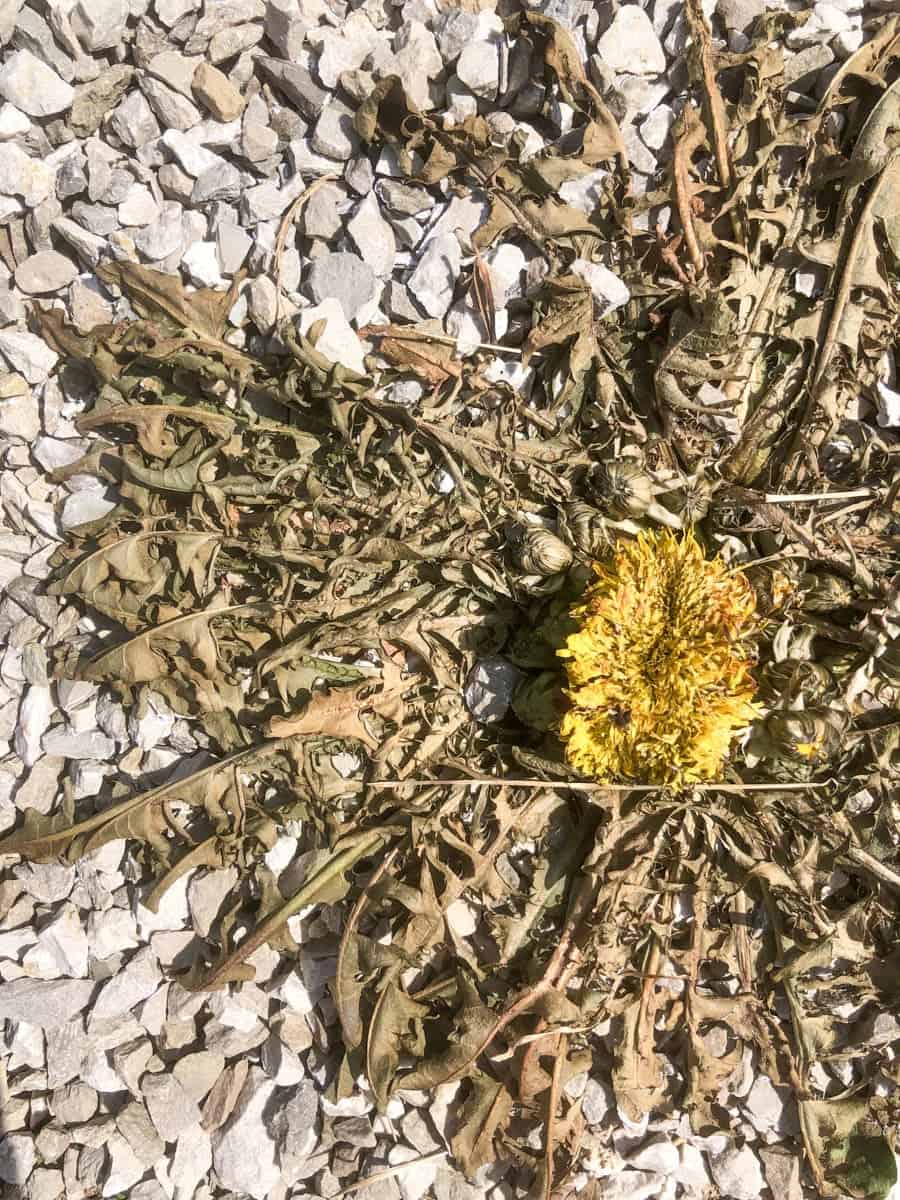
Table of Contents
Does homemade weed killer really work?
Yes—as long as you understand that homemade, all-natural weed killers work differently from synthetic herbicides. Many synthetic herbicides are systemic—meaning once sprayed onto the weed, they infiltrate the entire plant—leaves, stems, roots, and all—to kill the plant. This vinegar-based weed killer doesn’t kill the entire plant. Instead, it burns the foliage, making it difficult for the plant to survive (and easy to remove).

To have success with vinegar weed killer you need to focus on three things:
- Use good quality, high acidity horticultural vinegar—Many homemade weed killer recipes that call for regular kitchen vinegar may work on smaller, less stubborn weeds, but they require more frequent reapplication and nearly perfect weather conditions. We recommend using at least 15% vinegar, but most frequently we use 20% vinegar in our garden aisles.
- Watch the weather—You want to spray weeds early on a hot, sunny day to help amplify the foliage-burning properties of the weed killer.
- Reapply often to catch recently germinated weeds—Vinegar weed killer works better the smaller the weed. If you manage to get your weeds sprayed before they have established a robust root system, you are more apt to kill the entire plant.
Growfully Protip
Don’t be fooled into complacency by the name “vinegar.” All vinegar is acidic, but in particular, the high-strength vinegar we recommend here is very acidic. Please wear closed-toe shoes, goggles, a mask, and gloves when spraying. Also only spray on a calm day without wind. When spraying on a hard surface (like pavers, concrete, or walkways), test an inconspicuous spot before spraying the entire surface. Vinegar is acid!

How do vinegar and salt kill weeds?
The acetic acid in the vinegar and the salt in the weed killer does harm by pulling moisture from the foliage of the plant. When the foliage dies, the plant struggles to survive. It will kill some weeds and damage other stubborn weeds enough that they are easy to remove.
Does vinegar kill weeds permanently?
For some small weeds, high acidity vinegar can kill them permanently because they haven’t had a chance to establish a robust root system. For larger or stubborn weeds, vinegar will just kill the foliage, weakening the plant and making it easier to pull or hoe out.
Growfully Protip
Repeated application of vinegar weed killer eventually will acidify the soil enough to where weeds (and other plants) have a hard time germinating and growing. Use this as a benefit in areas where you don’t want weeds (like a gravel driveway), but unless you have very alkaline soil, we do not recommend regularly using vinegar weed killer in your garden beds.

How do you make and use homemade weed killer?
If you can stir or shake, you can make homemade weed killer. Here is the gist of it, and we have a printable version at the bottom of the post—print it out and put it in your garden journal.
- Put on personal protective gear, including goggles, a mask, and gloves.
- If using a higher concentration of vinegar (30% and 45% are commonly available on Amazon), dilute the vinegar with water to between 15-25% acidity. We’ve not seen any benefits to using vinegar in higher concentrations than 25%.
- Combine one gallon of 15- 20% vinegar, 1 cup of table salt, and 1/4 cup orange oil in a sprayer or spray bottle.
- Shake or stir well to combine. The salt will not dissolve completely, but that’s okay.
- On a hot, sunny day, spray the entire weed until it runs off the leaf tips. Make sure to agitate the mixture regularly to keep it mixed.
- You’ll start to see results within an hour or two depending on the weather. Full results will be seen within 24-36 hours.
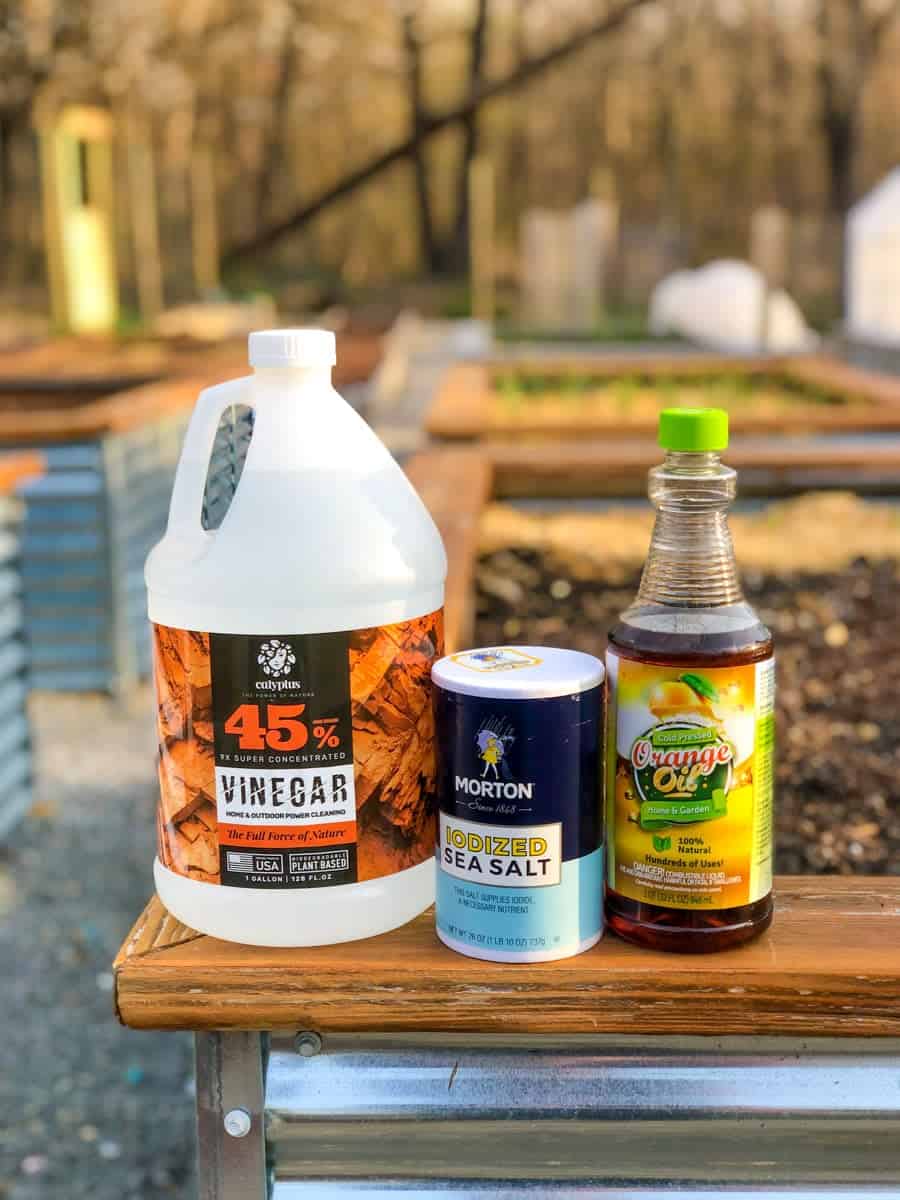
Growfully Protip
We use this weed killer in our garden aisles, on our long country gravel driveway, and all other hardscaped surfaces on our nine acres—so we mix up a ton at a time! We typically quadruple this recipe and mix it up in a four-gallon backpack sprayer.
Is mixing vinegar and Dawn safe?
Many homemade weed killers will call for Dawn or other dishwashing soap, and yes, it’s perfectly safe to use. The soap works as a surfactant to make the vinegar solution more sticky and viscous so it stays on the weed foliage longer.
We’ve tested recipes with liquid dish soap and instead, we prefer using orange oil. Orange oil also works as a surfactant, but it also helps mask the scent of vinegar, and it creates a barrier on the leaves of weeds to help lock in the chemical reaction. If you like to add dishwashing soap, go for it, but one bottle of orange oil will go a long way (and it smells sooo good)! We recommend experimenting to find the perfect formula for weed killer for your garden.
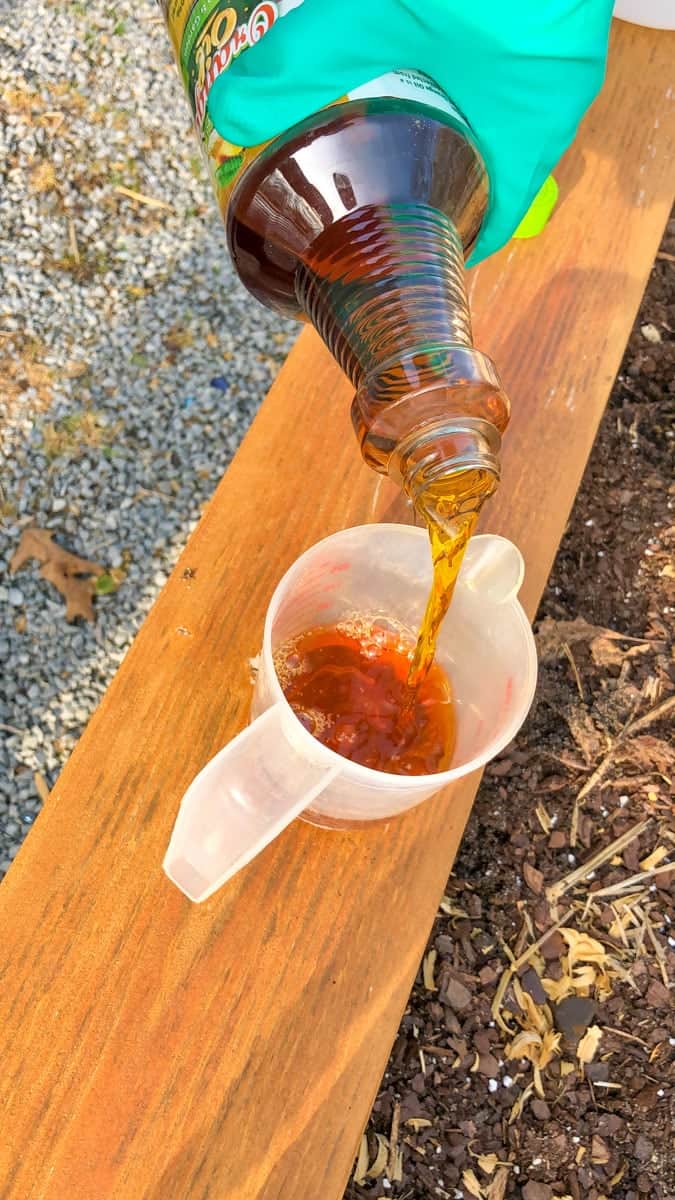
Can I just use household distilled vinegar?
If you’ve ever made homemade weed killer from a regular gallon of white vinegar, you might have been disappointed in the results. That’s because, in our experience, at 5% acidity, household vinegars just aren’t quite acidic enough to make a big impact on garden weeds.
Because kitchen vinegar is so affordable, we really wanted to make this work—but no matter what we tried (mixing it with salt, adding orange oil, adding dishwashing soap, spraying at different times of day, spraying at different amounts), we couldn’t get good results with distilled vinegar. It consistently killed the foliage on about a third of our weeds.
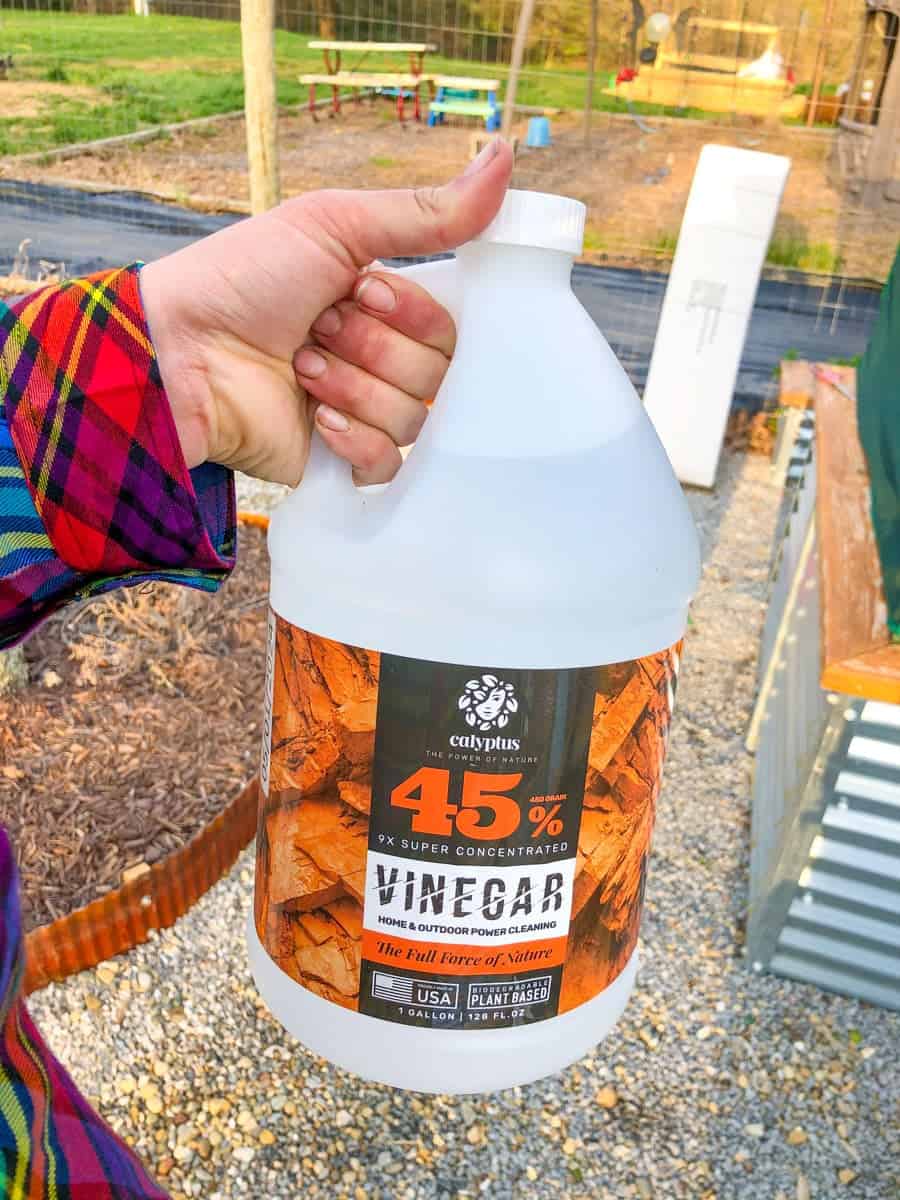
We instead recommend using at least 15% acidity vinegar—we had much most consistent and longer-lasting results with higher acidity. It’s what we use in our Growfully gardens all summer long.
Growfully Protip
Our recipe below is for the best natural weed killer we’ve found, however, for quick spot treatment, it works well just to just straight 15-20% vinegar on a hot, sunny day. We like that this brand even comes with a sprayer!
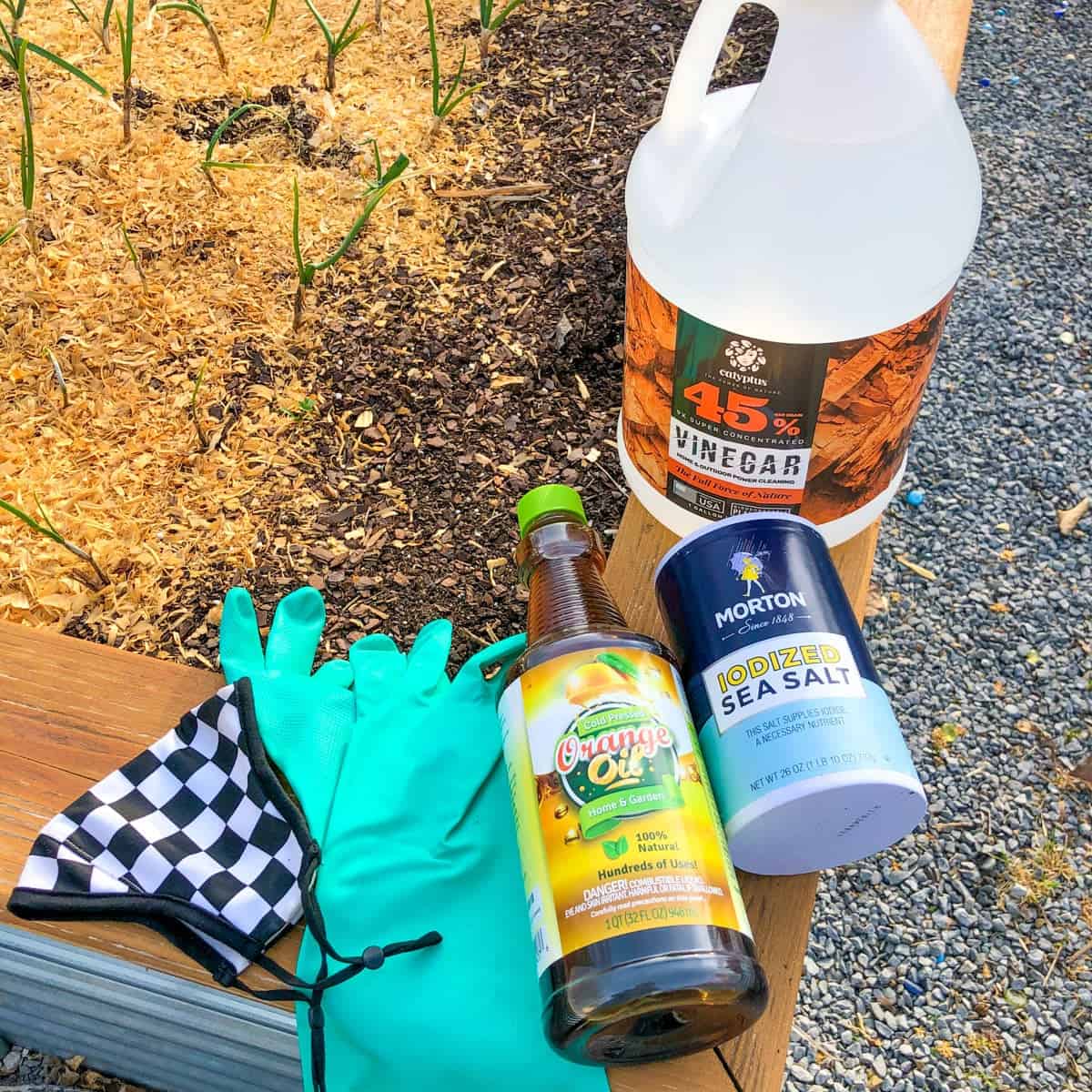
Does vinegar kill grass?
Vinegar weed killer works best on broad-leafed weeds, however, it will kill (or at least brown) grass as well. This weed killer is non-selective—meaning it will burn or kill any plant it touches.
What does the salt in the solution do?
If you’ve ever accidentally gotten salt in a wound, you’ll know that salt burns wounded tissue—the same thing happens here for the plants! The salt increases the damage caused by the vinegar. It is important to use table salt here (sodium chloride) instead of Epsom salt (magnesium sulfate). Epsom salt will not work as well, and in fact, is often used as a soil additive to make the soil healthier for plants.

What are the pros and cons of using homemade weed killer?
Like any decision you make in your garden, using vinegar weed killer has its pros and cons. We want you to be fully informed before you make a decision, so let’s cover them:
Pros of Using Homemade Weed Killer
- No synthetic ingredients—This is a big one! Our recipe contains all naturally-derived ingredients that are safe for organic home gardening. If you are uncomfortable using synthetic herbicides in your garden, this natural herbicide might be a good option for you.
- Quick and easy to make—Our recipe calls for just three ingredients (four if you are using a concentrated vinegar that needs to be diluted with water). It comes together in just a couple of minutes!
- Works quickly—On a hot, sunny day, you’ll start to see results within less than an hour on broad-leaf weeds. Within 24 hours, you’ll see significant destruction of those unwanted plants!
- Takes away some weeding pressure—We recommend relying on other weed control methods for the majority of the garden (pulling, hoeing, burning, heavy mulch), but if you are overwhelmed with weeds or are struggling physically to weed, this homemade weed killer can help relieve some of the pressure.
- Can reduce the number of weeds by acidifying the soil—If you have neutral or acidic soil, regularly applying this vinegar weed killer can make your soil acidic enough that weed seeds have trouble germinating and growing in those locations.
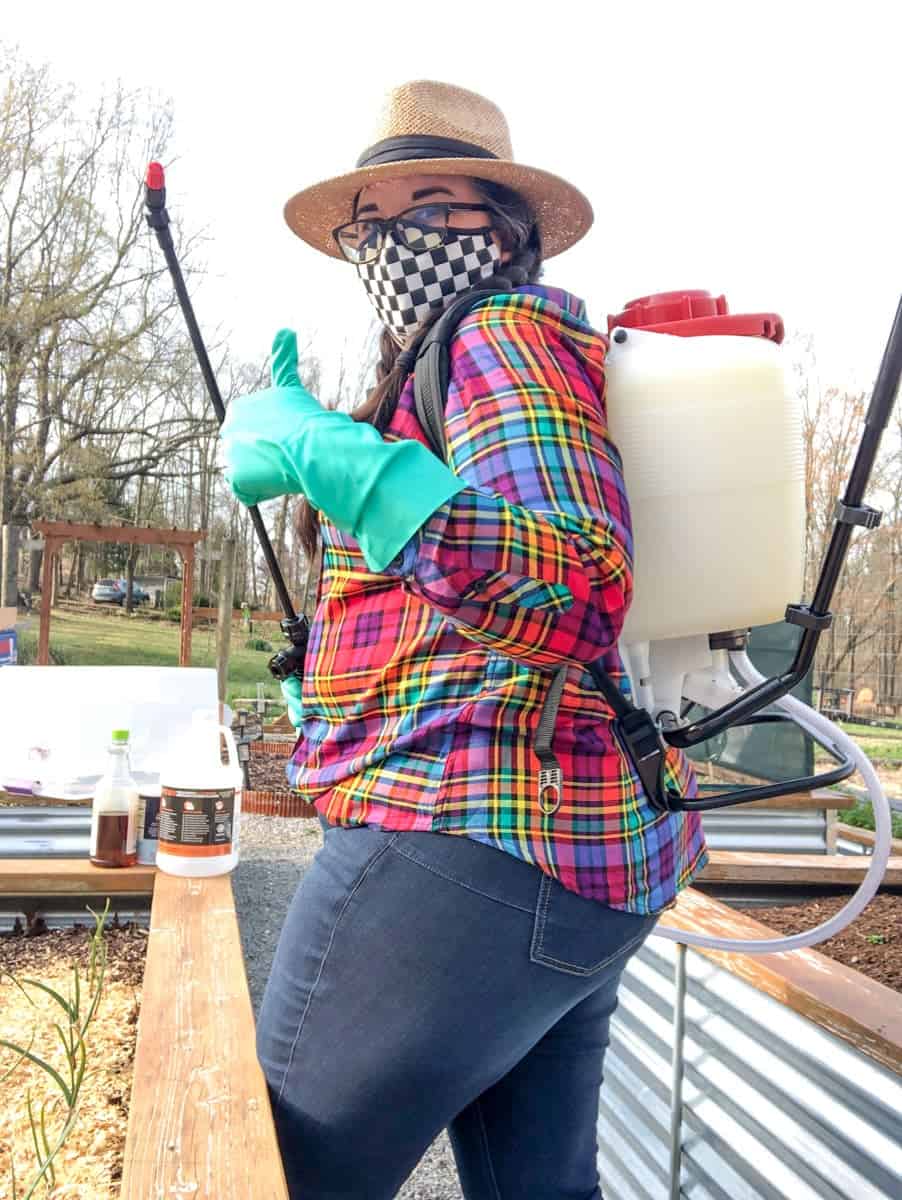
Cons of Using Homemade Weed Killer
- Requires reapplication—Because vinegar weed killer kills foliage instead of roots and isn’t a pre-emergence herbicide, it requires frequent reapplication for large weed infestations or stubborn weeds. We are on a regular schedule in the Growfully gardens. We spot spray weekly and do a large spray in our garden aisles and gravel driveway every 4-6 weeks during the summer.
- Acidify soil—This was a pro above, but it can also be a con if you have alkaline soil because you might actually be improving your soil, and making it more beneficial to weed growth.
- Not recommended for inside garden beds—Because of the acidifying properties, we do not recommend using this weed killer in garden beds (unless you have very alkaline soil, and then still use with caution).
- Strong smell—There is no getting around it, vinegar definitely has a strong odor! Our recipe uses orange oil, which helps mask the smell of the vinegar. The vinegar smell does dissipate quickly, and you’re left with a very pleasant citrus scent, but the vinegar is quite strong at first.
- Can be dangerous—Just because it isn’t a synthetic herbicide doesn’t mean this weed killer isn’t dangerous. Horticultural vinegar is a powerful acid, and it should be treated as such. Wear personal protective gear, never spray on a windy day, and keep it away from kids and pets. Quickly dilute any spills by rinsing well with water. Also, never mix up weed killer and store it long-term in a regular plastic spray bottle or sprayer—the acidity can degrade the seals and plastic over time. You can store the mixture in a glass container or an empty vinegar bottle—that plastic is designed to withstand the acidity.
- High acidity vinegar is expensive—A gallon of high acidity vinegar will run you between $15-$20. It will go a long way (especially if you go with a higher concentration of vinegar and dilute it), but if you have a large area to treat, it adds up quickly over a growing season.
Growfully Protip
We’ve tested a lot of combos, and we think we’ve nailed the best formula for DIY weed killer, but we highly recommend you experiment to figure out what mixture works best for your garden, your climate, your budget, your weeds, and your needs! What works for us might not be the best mixture for you.
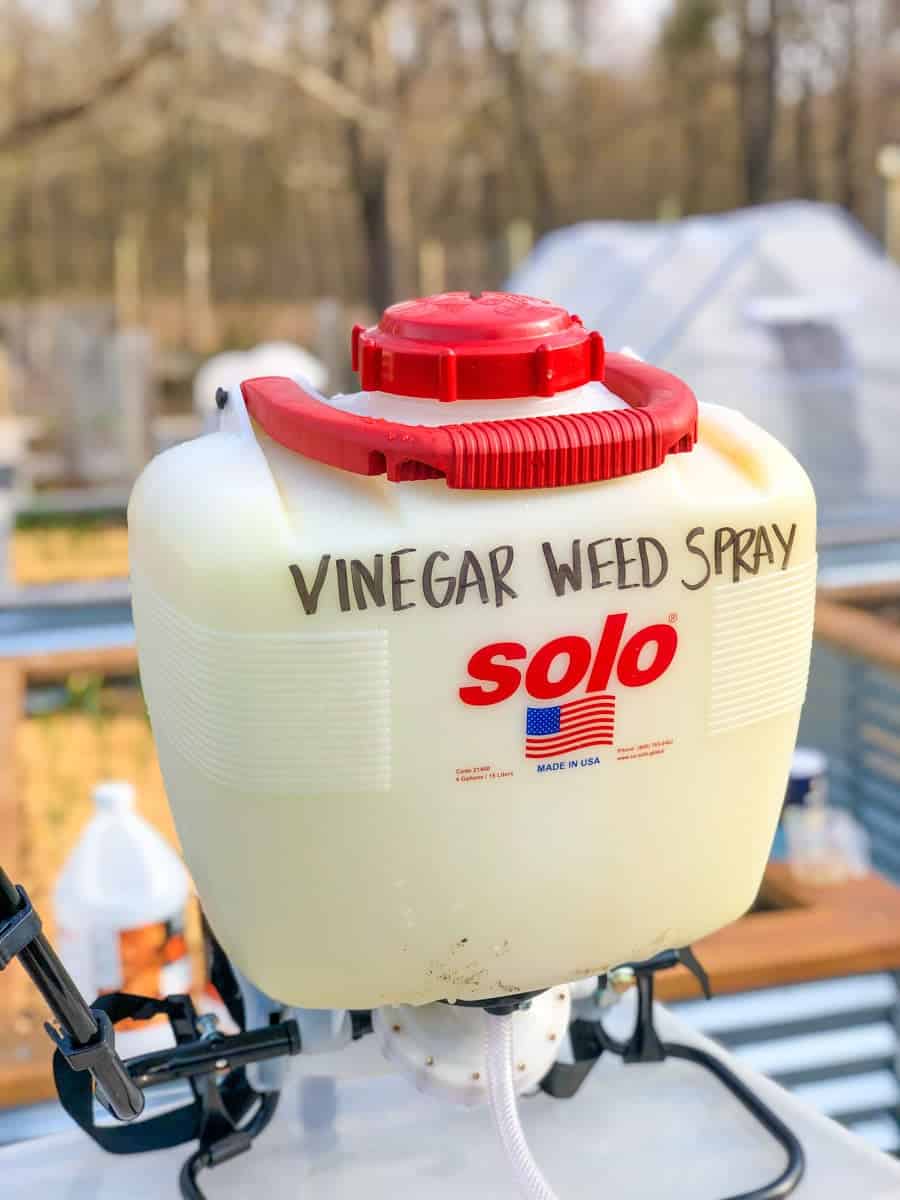
What are some other ways to tackle weeds in the garden?
There are tons of other ways to tackle weeds in the home garden, and we often recommend you use a combination to stay on top of the weeds. Here are some other things you can try in combination with this weed killer:
- Pulling and hoeing. The classic and our most recommended way to tackle weeds! Head to your garden every day, and if you see a weed, pull a weed.
- Smother weeds using black plastic, tarps, cardboard, or heavy mulch. This is useful when starting a new garden bed. You can smother weeds and grass, and it will eventually break down and feed the soil. Many people use plastic or tarps, and then remove them when the weeds are killed, but we prefer cardboard in the Growfully gardens. We simply cover the weeds with cardboard, cover that with soil, and plant away!
- Landscape fabric. Survey a group of gardeners and half will tell you they hate landscape fabric and the other half will tell you it saved their sanity! While landscape fabric does come with its cons, we use it regularly in the Growfully gardens to help reduce weed pressure in our aisles. We like the Dewitt Sunbelt Weed Barrier Ground Cover.
- Boiling water. If you have easy access to a way to boil water for your garden, pouring boiling water onto weeds can help kill the foliage and roots. Be very careful when working with boiling water as it can obviously burn skin easily.
- Corn gluten meal (AKA: Preen). Corn gluten meal is a natural byproduct of corn processing, and it also helps prevent weeds from setting roots after germination. Corn meal prevents all plants from setting roots after germination, so you do not want to spread it where you are germinating seeds, but it does work to prevent weeds in beds with established plants. Corn gluten meal must be reapplied frequently during specific weather conditions, and its efficacy increases with each application.
- Synthetic herbicides. Of course, if you are comfortable with using them, synthetic chemical herbicides are also available to handle weeds. We never recommend using synthetic herbicides in a vegetable garden, but we encourage you to make your own decisions about what you feel comfortable with within your own yard.

The Best Homemade Weed Killer
Materials
- 1 gallon of 15-20% horticultural vinegar
- 1 cup table salt
- 1/4 cup orange oil
Tools
- Personal protective gear (Goggles, a mask, gloves, closed toe shoes)
- Sprayer or spray bottle
Instructions

- Shake or stir the vinegar with the salt and orange oil. The salt may not dissolve completely.
- On a hot and sunny day, spray weeds until the spray runs off the leaf tips. Agitate the weed killer regularly to keep it mixed.
- You will see foliage turning brown and dying within an hour or two, and full results within 24-36 hours.
Notes
- Do not skip the protective gear. This vinegar is much more acidic than the kind you keep in your kitchen—please wear closed toe shoes, goggles, a mask, and gloves when spraying.
- Avoid spraying on a windy day. Again, this vinegar is very acidic and spraying on a windy day can be unsafe.
- Do not store leftover weed killer in a regular plastic spray bottle or sprayer, as the acidity of the vinegar can degrade the plastic over time. Instead, store the mixture in an empty vinegar bottle or glass container.

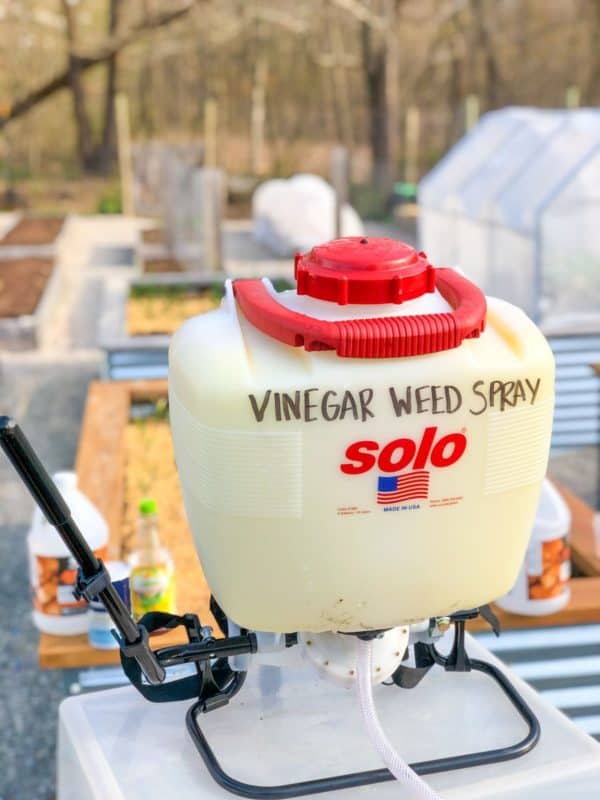
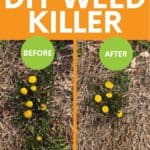
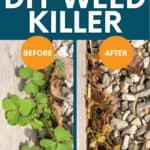



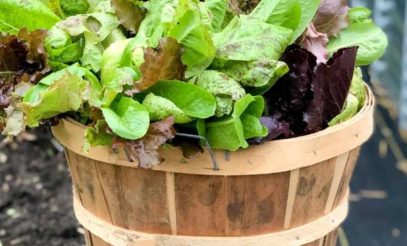

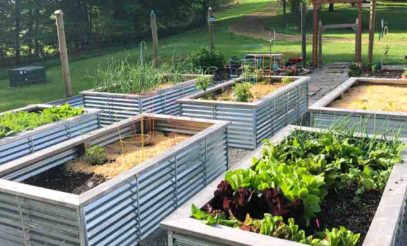
I have tried for many years and as yet I still haven’t mastered doing away with them I have spent pounds and pounds trying to get rid of them my garden is quite nice when the weeds are away. But it only lasts for a few weeks
then they start coming back and then we are back to square one. I was reading 📖 tonight before I started writing
this letter to see if anyone!s heard of white vinegar and salt and that will do away with them for good. So if anyone
has got any ideas I will be most obliged thanks for listing to me.
White vinegar or distilled vinegar or any other kitchen vinegar won’t be acidic enough to kill most weeds. You’ll have better luck with horticultural vinegar. But also, there isn’t really a way to permanently get rid of weeds—seeds can live in the soil for up to 7 years, and seeds can enter your garden via the wind, birds, etc. Removing weeds as you see them pop up can make it so that you don’t get overwhelmed with weeds though. Best of luck!
Hello, I have a question and is follows: if I use a very acidic vinegar greater than 25% what ratio of water would you suggest using in this mixture? Thank you for your time and info, have a great day!
It depends on how big and strong your weeds are, but we typically dilute our vinegar down to between 15-20%
I’m sorry but this did not work on my weeds.. I followed all the mixing instructions and ratios… i dosed the weeds in this solution at the hottest part of the day and went out a few hours later and they basically look the same… no browning and basically look like they got a watering…I don’t know what the issue is maybe it’s not effective on my type of weeds but for the cost of 1gl vinegar and salt and dish soap I was better off just going to a nursery and getting something more effective…
Question, I live in Norway and the only orange oil I can find is essential oils. So to ensure I can make an effective weed killer, what is the best replacement for orange oil?
Dishwasing detergent (like Dawn here in the States) will work. Just use 2 tablespoons of dishwashing detergent per gallon.
Use cheaper rock salt meant for water softeners. Morton’s from the spice shelf 100x more expensive.